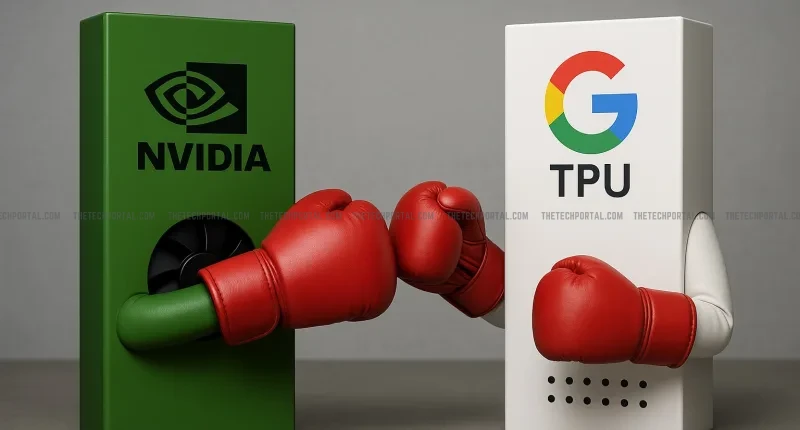With AI hardware adding and erasing billions from corporate valuations, a war of words is now on. Nvidia is back to flexing its dominance in AI hardware, claiming its GPUs are ‘a generation ahead’ of Google’s AI chips. The statement comes amid growing market chatter that Meta may adopt Google’s TPUs for parts of its AI workloads, hinting that Google has perhaps put up a competitive challenger to Nvidia’s dominating AI hardware so far.
According to the Jensen Huang-led firm, its GPUs are not just about raw speed – they are designed for flexibility, handling everything from massive AI model training to real-time inference, across data centers, research labs, and even edge deployments. On the other hand, Google’s TPUs are highly specialized, optimized for certain AI operations but less adaptable when models or workloads shift rapidly.
Technically, Nvidia’s GPUs are general-purpose processors capable of handling a wide range of tasks beyond AI, including graphics rendering and scientific simulations. By contrast, Google’s TPUs are ASICs (application-specific integrated circuits) engineered primarily for matrix operations that dominate neural network training and inference. While TPUs can outperform GPUs on narrowly defined tasks, Nvidia claims their rigidity can be a liability when AI workloads evolve and diversify.
The company, which touched a $5 trillion valuation last month, also leans heavily on its software ecosystem as a competitive edge. Tools like CUDA, cuDNN, and the broader Nvidia AI stack allow developers to optimize workloads across multiple environments efficiently. This ecosystem, combined with the massive computational power of its hardware, has helped Nvidia secure over 90% of the high-performance AI GPU market, supplying chips to major cloud providers, universities, startups, and tech giants.
Despite all this, Meta’s rumoured interest in Google’s TPUs has put Nvidia on the defensive. Beyond the Nvidia–Google rivalry, the AI chip landscape is rapidly evolving. Companies like Graphcore, Cerebras, and other specialized startups are developing AI accelerators customized for specific workloads, further increasing pressure on Nvidia.
Along with competition, Nvidia is feeling pressure from other directions as well, especially from some big investors. In the past few weeks, both SoftBank and Peter Thiel’s fund have completely unwound their Nvidia stakes. Thiel Macro LLC sold all 537,742 shares, a position that had accounted for around 40% of the fund’s entire portfolio. SoftBank made an even bigger move earlier, exiting its massive 32-million-share holding and generating about $5.8 billion from the sale. Although neither exit necessarily reflects a long-term view on Nvidia’s fundamentals, the timing has sparked fresh conversation about big-money investors cashing out while the stock remains near its highs. It appears to be less about doubt in AI itself and more about whether the market is pricing in future growth too aggressively.
The response to these challenges and developments is clearly hitting Nvidia hard. Over the past month, its shares have fallen around 10%, deepening a broader downturn that has wiped about $800 billion off the company’s peak valuation in recent weeks. The situation becomes even more critical as Nvidia simultaneously faces major regulatory hurdles and intensified scrutiny, particularly regarding its business dealings in China.
The Tech Portal is published by Blue Box Media Private Limited. Our investors have no influence over our reporting. Read our full Ownership and Funding Disclosure →






